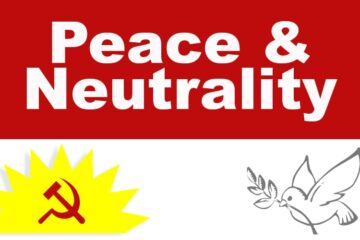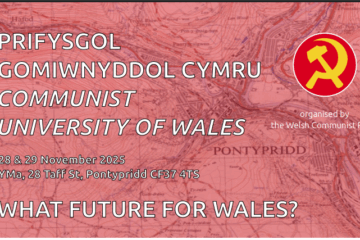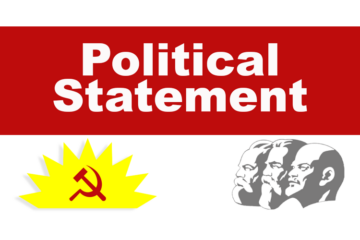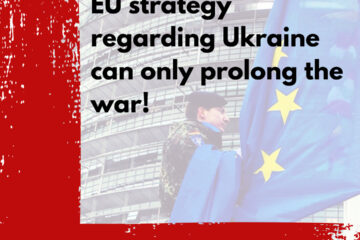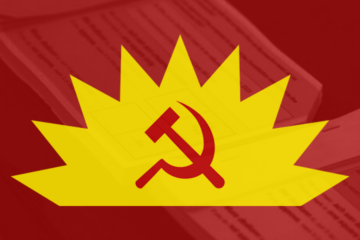National Executive Committee, Communist Party of Ireland
6 December 2016
The National Executive Committee of the Communist Party of Ireland, meeting in early December, discussed current political developments and the nature of the struggle that working people face into as we approach a new year.
The capitalist system is marked by an emerging political crisis, albeit at an early stage of development. As the Communist Party of Ireland has pointed out for several years, the European Union is facing a growing crisis of legitimacy in the eyes of working people throughout Europe. Since the current economic crisis burst forth in 2008, working people have borne the brunt of attacks, in the form of austerity, attacks upon their living standards and their working conditions. Workers have experienced and are experiencing increased exploitation.
Neo-liberalist policies, serving the interests of the “market” and of state monopoly capitalism, are firmly embedded within the treaties of the European Union. In particular this is reflected in the drive to establish the single market. The interests and needs of transnational corporations are given priority over those of workers. The ruse of a “social Europe” lies shattered upon the collapsing and decaying corpse of social democracy.
In many capitalist countries workers are struggling to find a way forward out of the crisis and the barbarism that they face daily. The old order is increasingly finding it difficult to rule in the old way, but the class-consciousness of the working class has not yet matured enough to mount a challenge from the left and instead is finding expression in support for the populist right as well as the recent emergence of “new forces” wishing to fill the vacuum created by the continuing collapse of social democracy.
The Communist Party of Ireland believes that the growth in both of these is related to the abdication of opposition to the European Union by the left and democratic forces. This has left space for the emergence of the right to appear to champion national democracy and sovereignty.
The Irish state and capitalist class are facing multiple problems stemming from continued membership of the European Union and in particular its adoption of the euro. “Brexit” poses and will continue to pose challenges as well as opportunities for our people, north and south. The interests of working people and their economic future will be decided by what is in the interests of the big powers within the EU, and within the negotiations between the EU and Britain if Britain triggers article 50 in March 2017. It is clear that the interests of the Irish people will be a long way behind the interests of state monopoly capitalism and the City of London. The negotiations on Brexit can only further expose the marginalised situation of the people in the north of Ireland, and how little sovereignty the Irish state has left.
The other challenge facing the Irish state could come from developments within the United States as state monopoly capitalism pushes hard for further reductions in corporation tax and from growing public opposition to corporate inversion (manipulation of the Irish tax incentives). The British state may also follow this approach of reducing corporation tax to encourage global capital to come to, or remain in, the British state.
This may well bring the British state into more direct competition with the Irish state in attracting global capital and could well end the strategy of the Northern Ireland Executive of competing with the Irish state in striving to be a more attractive venue for investment.
The Irish capitalist class has built its whole strategy of economic development on attracting big monopolies to establish themselves within the state. With events now unfolding, this may well come unstuck.
As they have built a job strategy on precarious terms and conditions for workers, so is their economic strategy becoming more and more precarious. This is shown by the recent scandal involving the giant Apple Corporation, which flushes its global profits through an Irish address to avoid paying taxes—this with the connivance and support of the Irish government. These profits were derived from the super-exploitation of the lowest-paid workers around the globe. The taxes that the Irish state derives from such profits are nothing more than imperial rent.
In the case of the Apple Corporation, as with transnational corporations in general, we can discern the broader interconnecting trends that are shaping the economies of both the powerful core of imperialist states and the peripheral weaker states.
This model of economic and social development is now coming under growing pressure from events beyond the control of the Irish ruling class: the possible impact of Brexit, the EU Commission’s push towards the harmonisation of corporation tax by 2021, and the election of Trump in the United States. Working people, north and south, face a very unsure future as decisions are made that may have a profound impact upon them and their families and communities. This needs to be countered by mobilisation and resistance by working people.
In regard to the recent report published by the Commission on Water, working people need to be very circumspect regarding its contents and the strategy of the establishment parties and their media. While it is to be welcomed, reaction to the commission’s proposal in regard to public ownership of water must be tempered until we see what the establishment is prepared to do in regard to a constitutional amendment.
We need to remember how fickle establishment promises are in reality, and the bitter experience regarding bin charges. There needs to be a renewed mobilisation to secure a referendum on ownership and to secure a real and meaningful victory in relation to water charges.
The CPI welcomes the growth in workers’ militancy, particularly in public transport, where the workers secured significant pay increases. We also welcome the struggle being engaged in by ASTI in its demand for equal pay for equal work and its efforts to end discrimination against young teachers entering that profession.
Workers need to push forward their just claims to undo the cuts in wages and increased work burdens and the attacks on their terms and conditions.
We need to defend the limited all-Ireland economic co-operation that exists and to build upon it in such areas as health, farming, fishing and cross-border community development and push forward to deepen economic co-operation in all areas.
The party reiterates its call to Irish workers to demand that the Irish state break with the euro and withdraw from the European Union, which has never served the interests of working people. Working people and their organisations throughout Ireland need to campaign for their own alternative, radical transformative social and economic strategy, involving all the working people of Ireland.
Make 2017 a year of renewed struggle and resistance!



